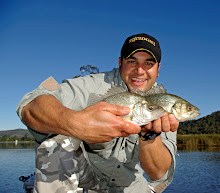You hear all kinds of myths in fishing. Its one of those sports where people have thier own idea just where and when is the best time to go out and catch thier fish. The variables in fishing, but more so in the conditions relevant to fishing, make putting it all together a litteral jig saw puzzle, to use a well coined cliche. Trying to make sense of it all makes your head spin.
I liken it to horse racing. You can study all the variables like distances run, wet weather galloper, favorite tracks etc and can and over think the whole issue. Then a woman who knows nothing rocks up and selects a horse based purely on the cool name and picks the winner paying 20bux. Does you head in!
So lets look at all the variables in fishing and try to put some sense into all the mystery.
Tides
Probably the most contentious topic in all of fishing. I hear agruements all the time whether a fish bites best on the rising tide or on the falling tide. Sometimes its the slack water at the bottom of the tide or the slack at the top??? What complicates things further is that the same species can bite better on different tides in different waterways...the mind really can boggle.
Time of te tide can be dependant on the food sources available too. If your targeting bream that are feeding actively on the prawn run, an outgoing tide will be better. If your chasing bream feeding on crabs, then a big high tide will give the bream access to new water anavailable at low tide. Either can be targeted to good effect. So perhaps knowing what the bait movements are can help decide what part of the tide you need to fish.
There are however some traits on fish that can give a relative idea about where fish will be and when they'll bite best. use flathead as an example, you can bank on em feeding more aggresively when the tide runs out. As an ambush predator they use the outgoing tide to thier advantage. As flats drain all baitfish HAVE to exit the flat...in comes the flathead. As i said though, its not always the case. Some of my hottest flatty bites hve been on the incoming tide. It pays to be reactive to the situation at hand.
Low Light
Some people put stock into the low light periods of the day; either sunrise or sunset. The theory being predatory fish hunt more actively on the dark than at full light. Also the baitfish seem to be less flighty at low light too, so they can be hunted better. This can be true for Jewies who's massive pink eye is suited to seeing in low light. But dont fall into the trap of thinking jews can only be caught at night. Daytime is my preferred time.On the flats or in shallow water low light can be a blessing too as fish will cease to be timid.
The drawback with low light is it doesnt hang around long enuf. If you based your fishing purely on this you would fish 3 hours in a day! Sure its beneficial to fish sunrise but its the starting point of the day. fish caught at this time can set the tone for the day.
Moon Phase
this can go hand in hand with low light at times. The moon phase is another hotly contested fishing variable. Some old salts swear by the 3 days leading into the new or full moon and the 3 days after as the prime time to chase Jew. I've heard that the actual day of the full moon is very poor though...too much light??? Who knows. Fact is the lunar cycle definately has an effect. That's about as much as i can relate. Once again i've caught fish thoughout the lunar cycle so no time for me seems to be obviously better.
It's more likey the effect the moon has on the tides than the moon itself. The moon does produce light though, so the theory of low light does have merit too.
Barometer
This one can confuse me at times. Bass fishos will swear by a rising barometer over 1015 (i think)and if it falls under 1010 they wont bother going out for a fish. Other theorys ive heard say a falling barometer is better for fishing, especially after a thunderstorm. I can certainly agree that some our best days fishing have been in the build up of a storm, which indicates a rising barometer. Some days killer days have come preceding a storm and a get a few days consistent rain. This indicates a fallen barometer then a levelling out, perhaps at, say, 1000.
So no categorical evidence there to suggest you should live and die by the barometer too.
Seasons
Perhaps the only thing you can probably bank on is time of year. although global warming is having its effect. For example the annual summer whiting run, which typically started in Nov every year now commences in Feb. The transitional months of autumn and spring seem to be the best producers of fish numbers, most prob due to change over of species. The winter fish are moving in while the summer fish are moving out. The demarcation is not sudden so autumn and spring allows you to catch good mixed bags.
In a nutshell, dont bank on anything. If you live and die by any condition you may as well not go out. Any time is good time to catch a fish. Only requisite is you need to have your line in the water!
Subscribe to:
Post Comments (Atom)

No comments:
Post a Comment